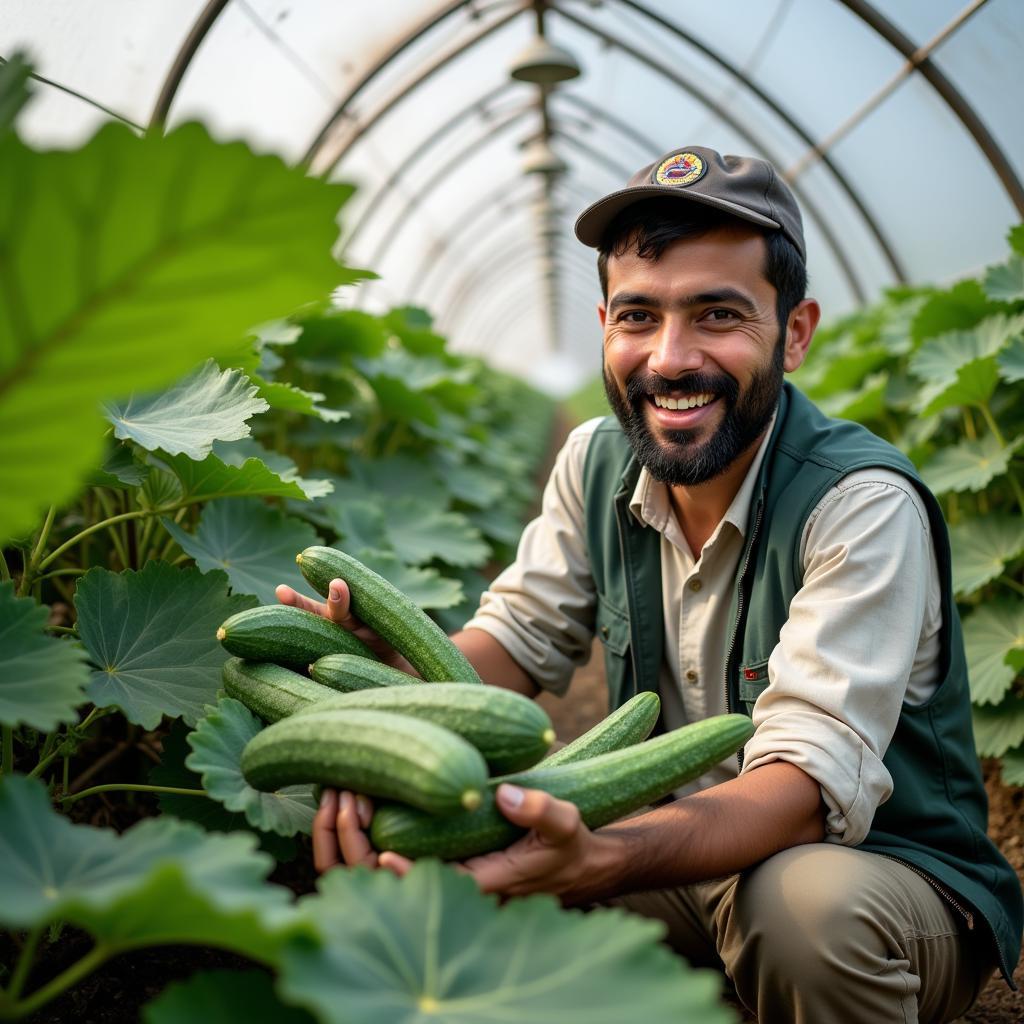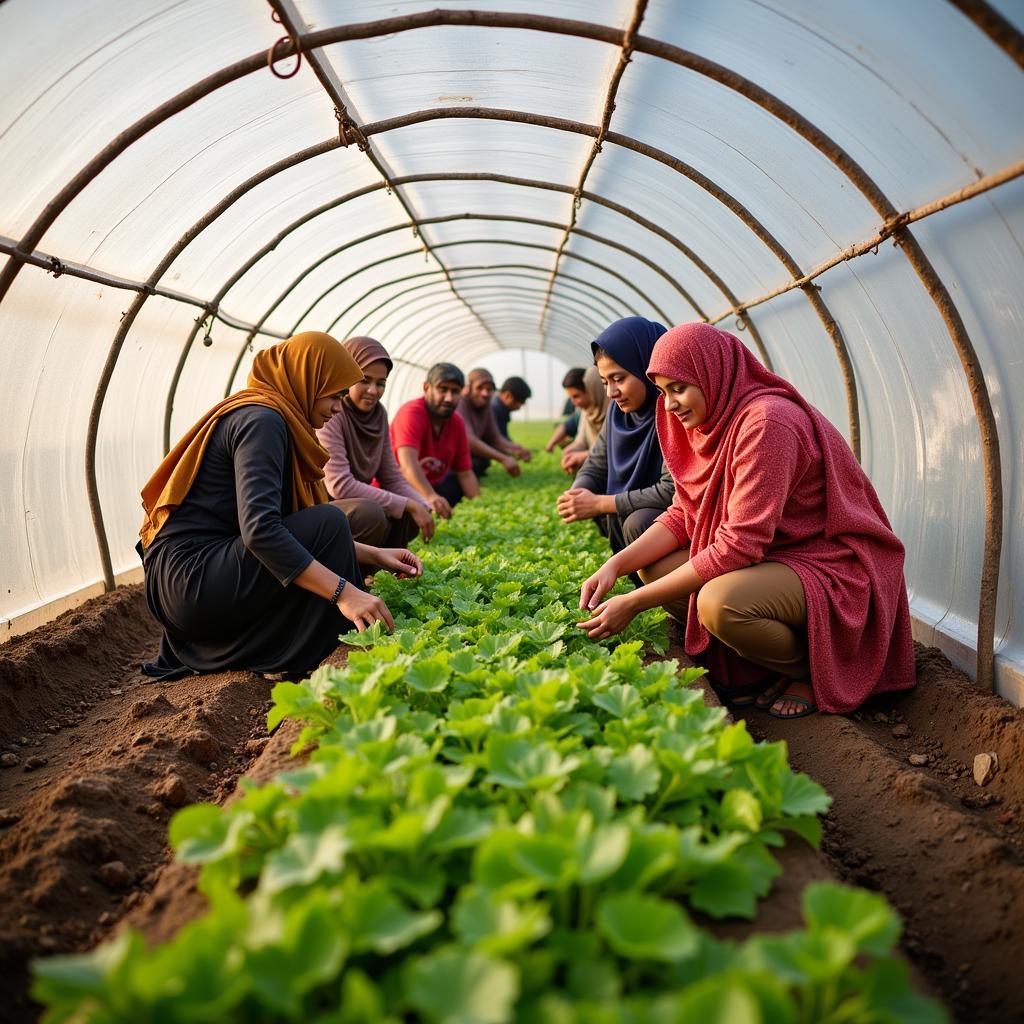Tunnel Farming In Pakistan is rapidly gaining popularity as a cost-effective and efficient method of producing high-quality crops year-round. This innovative technique involves growing crops under protective structures, commonly made of polyethylene, to create a controlled microclimate that optimizes growing conditions.
Advantages of Tunnel Farming in Pakistan
Tunnel farming offers numerous advantages for Pakistani farmers, including:
- Extended Growing Seasons: Tunnels protect crops from harsh weather conditions like extreme heat, cold, wind, and hailstorms, allowing farmers to grow crops even during the off-season.
- Increased Yield: The controlled environment within the tunnel optimizes temperature, humidity, and light, leading to faster growth rates and higher yields compared to traditional open-field farming.
- Water Conservation: Tunnel farming significantly reduces water consumption through efficient irrigation methods like drip irrigation. The enclosed structure minimizes water loss due to evaporation, making it a sustainable option in arid regions of Pakistan.
- Improved Crop Quality: The controlled environment and protection from pests and diseases result in healthier plants and superior quality produce.
- Higher Profits: Increased yields, off-season production, and premium prices for high-quality produce contribute to higher profitability for tunnel farmers.
 Pakistani farmer harvesting cucumbers
Pakistani farmer harvesting cucumbers
Popular Crops for Tunnel Farming in Pakistan
A wide variety of crops are suitable for tunnel farming in Pakistan, including:
- Vegetables: Tomatoes, cucumbers, peppers, eggplant, okra, spinach, and lettuce
- Fruits: Strawberries, melons, and watermelons
- Flowers: Roses, lilies, and carnations
How to Start a Tunnel Farm in Pakistan
Setting up a tunnel farm requires careful planning and investment. Here’s a step-by-step guide:
- Site Selection: Choose a well-drained location with ample sunlight and access to water resources.
- Tunnel Structure: Select a tunnel structure based on the chosen crops and local climatic conditions. Common options include low tunnels, high tunnels, and greenhouses.
- Irrigation System: Install an efficient irrigation system like drip irrigation to optimize water usage.
- Crop Selection: Choose crops suitable for tunnel farming and market demand.
- Planting and Care: Follow recommended planting practices and provide proper care, including fertilization and pest control.
Challenges and Solutions in Tunnel Farming
Despite its advantages, tunnel farming in Pakistan faces challenges:
- Initial Investment: The cost of tunnel construction and irrigation systems can be a barrier for small farmers.
- Technical Expertise: Lack of knowledge about tunnel farming techniques and crop management can hinder success.
To overcome these challenges:
- The government and NGOs are providing subsidies and training programs to support tunnel farming initiatives.
- Farmers can collaborate and form cooperatives to share resources and knowledge.
 Pakistani women farmers tending to their crops
Pakistani women farmers tending to their crops
The Future of Tunnel Farming in Pakistan
Tunnel farming has immense potential to revolutionize agriculture in Pakistan. By adopting this technology, Pakistan can:
- Enhance food security by increasing crop production and extending growing seasons.
- Improve farmer livelihoods through higher incomes and year-round employment opportunities.
- Promote sustainable agriculture practices by conserving water and reducing reliance on pesticides.
Conclusion
Tunnel farming in Pakistan is transforming the agricultural landscape by offering a sustainable and profitable solution for farmers. As the demand for high-quality produce continues to rise, embracing this innovative approach will be crucial for ensuring food security and economic growth in the country. For any assistance or information regarding tunnel farming, please contact us at +923337849799, email us at news.pakit@gmail.com, or visit our office located at Dera Ghazi Khan Rd, Rakhni, Barkhan, Balochistan, Pakistan. Our customer service team is available 24/7 to assist you.